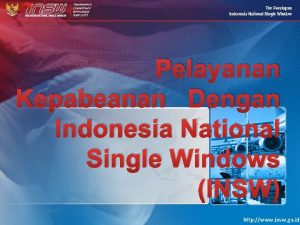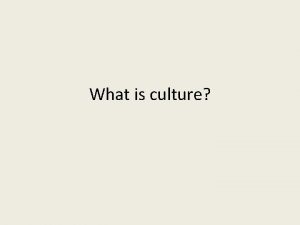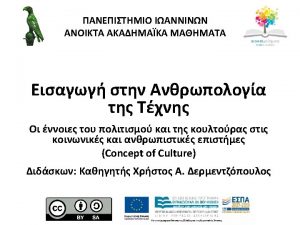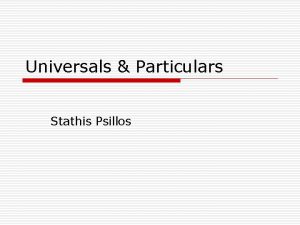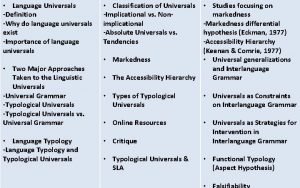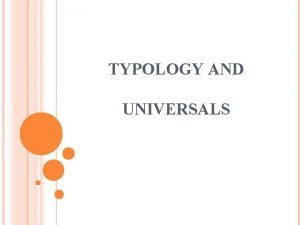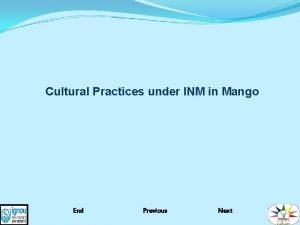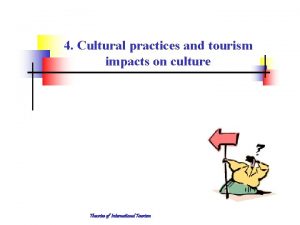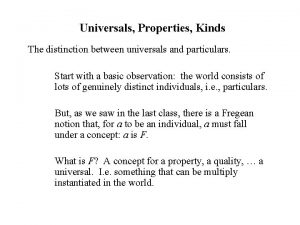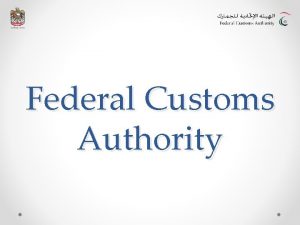Cultural Universals Cultural universals are customs and practices












- Slides: 12

Cultural Universals Cultural universals are customs and practices that occur across all societies. They include: • Appearance • (eg. bodily adornment, hairstyles) • Activities • (eg. sports, dancing, games, interaction) • Social Institutions • (eg. family, law, religion) • Customary Practices • (eg. cooking, folklore, gift giving, hospitality)

Components of Culture All cultures have 4 common (non-material) components of culture. These contribute to both harmony and conflict in a society. They are: • Symbols • Language • Values • Norms

Symbols • Symbols – anything that meaningfully represents something else (eg. wedding rings, flags, peace sign) • Culture can’t exist without symbols; they help us communicate ideas such as love and patriotism • However, sometimes symbols will be interpreted differently by different cultures Examples: • In the Western world, purity is symbolized by the colour white For Indo-Canadians, however, purity is symbolized by the colour green. • To most people, the swastika represents hatred and intolerance. To White Supremacists, however, it represents goodness and love.

Symbols • Symbols can also affect our thoughts about gender, race and ethnicity Examples: • The colour of clothing has symbolic meanings for male and female. Babies are almost invariably dressed according to whether they are boys (blue or red) or girls (pink or yellow). • Black and white are not the true colours of peoples’ skin, but we nevertheless make references to people at a racial level by using these terms. When we think of our thought-associations with these colours, ‘black’ is often viewed negatively while ‘white’ is viewed positively. Why don’t we say ‘pinkish-tan’ or ‘goldenbrown’?

Language • Language – a set of symbols that express ideas and enable people to think and communicate with one another (eg. Verbal [spoken], non-verbal [written, gestured]) • Language creates visual images in our heads Language and Social Reality: • Does language communicate reality or does it create reality? • Examples: • When we use the terms pro-life or pro-choice, are we expressing reality as it is or are we creating it? • Some Aboriginal languages do not have personal pronouns for gender (ie. he / she). How would their use (or lack of use) of these terms shape their reality?

Language • Language and Gender • How does our language reflect our cultural assumptions about gender? • Examples: • Gender-specific references to occupations (see p. 76). eg. mankind or chairman • Language, Race and Ethnicity • How does our language reinforce our perceptions and misconceptions about race and ethnicity? • Examples: • Derogatory references to minority ethnic groups eg. Negative associations with ‘black’; Choosing words such as primitive or Indian in reference to Aboriginals

Values • Values – collective ideas about what is right and wrong, good or bad, and desirable or undesirable in a particular culture (eg. Equality, fairness, tolerance, dialogue, diversity, Canada’s natural beauty, Canada’s global image) • Values typically come in pairs of positive and negative (eg. brave vs cowardly; hardworking vs lazy) • Value contradictions • These are values that contradict with one another or are mutually exclusive • For example, 84% of Canadians feel that “people who are poor have a right to an adequate income to live on”, but many of them still show strong support for governments that cut budgets in order to reduce deficits

Values • Ideal vs Real culture • Ideal culture refers to the values and standards of behaviour that people in a society profess to hold • Real culture refers to the values and standards of behaviour that people actually follow (For example, we might think of ourselves as “good citizens”, but still drive above the speed limit or do engage in other illegal activities however seemingly harmless. )

Norms • Norms – established rules of behaviour or standards of conduct (eg. pay taxes, don’t talk while you eat, say please and thank you, don’t drive and drive) • Formal vs informal norms • Formal norms are written down and involve specific punishments for violators (eg. Laws) • These may be enforced by sanctions, either positive (from simple praise to medals of honour) or negative (ranging from mild disapproval to life imprisonment) • Informal norms are unwritten standards of behaviour understood by people who share a common identity. When they are violated, other people may apply informal sanctions (eg. a frowning gesture, a public scolding, etc. )

Folkways • Folkways – informal norms or everyday customs that may be violated without serious consequences within a particular culture • These are rules of conduct that aren’t necessarily essential to a society’s survival. (eg. brush your teeth, don’t wear white after Labour Day, wear deodorant, etc. )

Mores • Mores – strongly held norms with moral or ethical connotations that may not be violated without serious consequences in a particular culture • These are based on culture values, so they are considered crucial to a society’s well-being • Taboos are mores so strong that their violation is considered to be extremely offensive and even unmentionable. (eg. Incest)

Laws • Laws – formal, standardized norms that have been enacted by legislatures and are enforced by formal sanctions • Civil law vs criminal law • Civil law deals with disputes among persons or groups. Usually involves compensation or fines as restitution. (eg. minor traffic accident) • Criminal law deals with public safety and well-being. Usually involves major fines or prison sentences as restitution. (eg. murder) Changes in law often reflect changes in culture. (eg. Racial or religious hate crimes, more liberal definition of marriage

